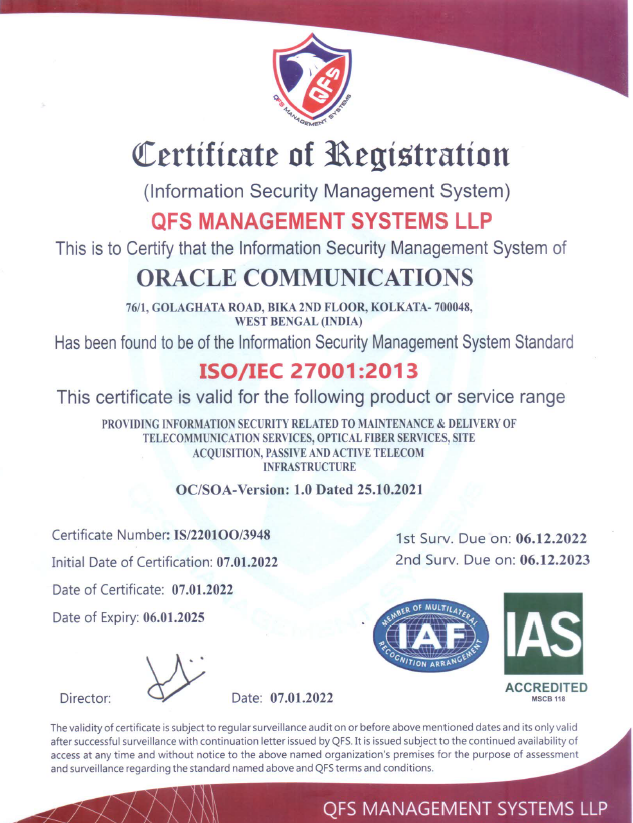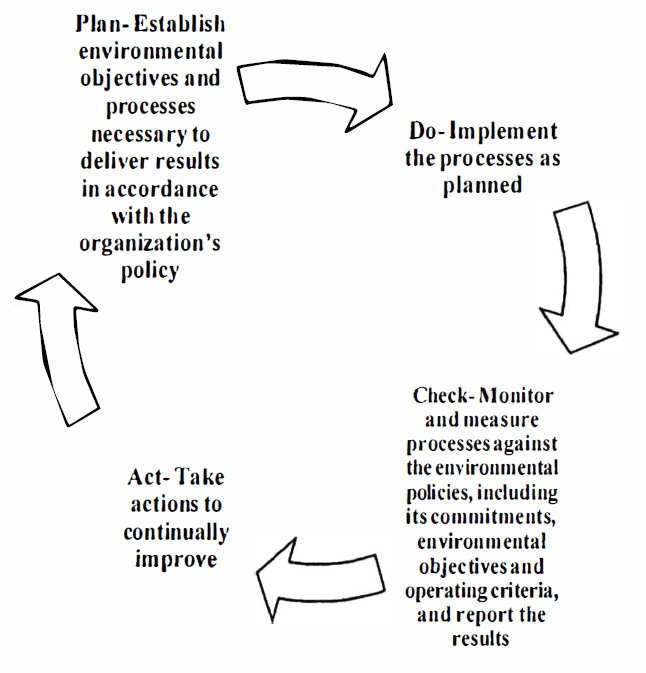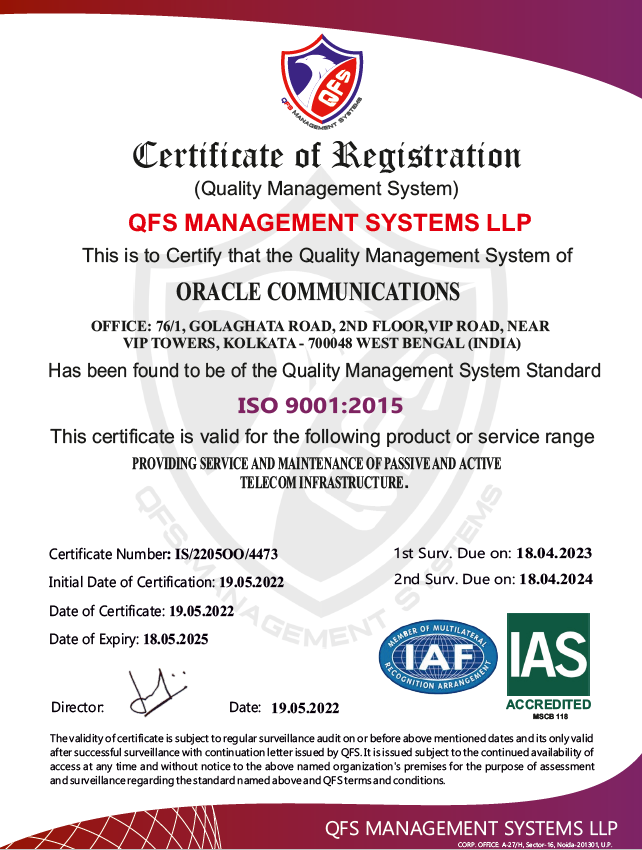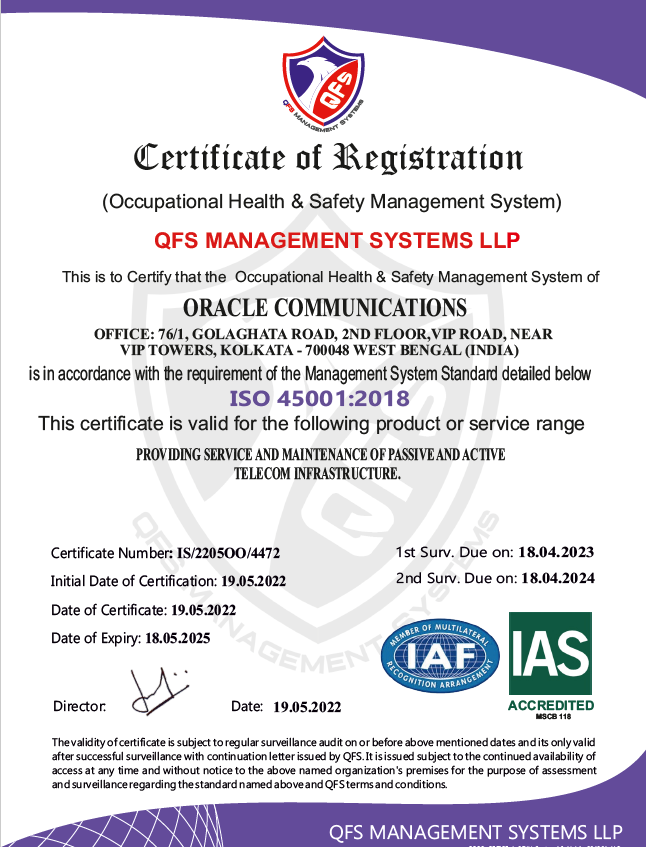Environment Policy
1. Introduction:
Oracle Communications is an environmentally conscious company and is committed towards the environment. The company intends to maintain responsible and sensitive behavior towards the environment by adopting measures to minimize environmental impact from our business.
We endeavor to embed sustainability as a way of business by striking a balance between profitability, social development and reducing adverse environmental impacts. We have committed to become a Net Zero Emissions Company by 2050 or sooner.
2. Applicability:
This Policy is applicable to all projects, businesses and activities.
3. Objective and Scope:
Through this policy we reinforce our commitment to adopt sustainable environment management practices for all our activities and places of operations. We endeavor to also work actively with our partners and customers for adoption of this policy.

We have developed and implemented an Environment Management System, consistent with worldclass standards to ensure that our business operates in an environmentally responsible and sustainable manner. It is in line with the Plan-Do-Check-Act (POCA) Model of the ISO 14001, which provides for an iterative process to achieve continual improvement as a part of the EMS and each of its elements.
Our Environment Management System includes (but not limited to) the following basic principles:
- We strive to Comply with aII applicable environmental laws; legislations and rules in every geography that we operate in; meet, and exceed where feasible, all the laid down standards.
- We strive to set targets and objectives to minimize or mitigate any impact on the environment.
- We strive to assess our environmental risks, their impacts and adopt mitigation measures to manage those risks.
- We aim for continuous environmental performance improvement by adopting/implementing appropriate available practices and technologies.
- We will continue to provide appropriate training to all employees and business partners on the importance of minimizing risks to the environment and the impact of their actions on the environment.
- We will continue to spread awareness to our stakeholders on adoption of environmentally friendly practices in line with our policy.

4. Responsible Management of Environmental Impacts:
a) Energy and Climate Change Management- In line with our commitment to become a Net Zero Emissions company by 2050, we have developed and implemented the Energy and Climate Change Management system with the following principles:
- We aim to adopt and promote global best practices on energy management and climate change adaptation.
- We aim to promote, engage and invest in energy consumption reduction projects including energy conservation, energy efficiency, fuel switch and clean energy in our operations.
- We are committed to increase the share of renewable energy in the overall energy mix.
- We aim to set ambitious targets for reduction in non-renewable energy consumption and report progress.
- We strive to minimize Greenhouse Gas (GHG) emissions from our operations and maintain year-on-year efforts to reduce GHG emissions.
- We will continue to measure and report our GHG emissions including our indirect emissions in the value chain.
- We will continue to monitor and report other air emissions including SOx, NOx, CO and PM from our operations.
- We endeavor to proactively and voluntarily offset the company’s impact on the climate.
- We will continue to provide appropriate training to all employees and business partners on the
- importance of energy efficiency and promoting a culture of energy conservation throughout the organization, thereby minimizing climate risks.
- We will continue to spread awareness to our stakeholders on climate change and its adaptation.

b) Waste Management System- Natural resource conservation is key to our environmental strategy. We endeavor to set zero waste targets and develop a comprehensive waste management plan to achieve our waste management goals through the following principles:
We will continue to provide appropriate training and awareness to our stakeholders on better waste management.
We strive to conduct thorough assessment of our waste streams to monitor waste generated.
We will continue to deploy the 3R (Reduce, Reuse & Recycle) strategy in waste management to effectively manage all types of waste produced from our operations.
We strive to adopt a circular economy model in our business.
We will continue to provide appropriate training and awareness to our stakeholders on better waste management.
c) Water Management System- We recognize that water is an essential shared resource, and we are committed to the principles of waler stewardship to address the increasing global concern of water scarcity:
- We aim to adopt and maintain global best practices on water management and minimizing water related impacts throughout our operations.
- We aim to monitor, report and promote judicious water consumption in our business.
- We strive to set targets and identify actionable opportunities on improving efficiency in water consumption.
- We strive to avoid pollution of surface water, ground water and other water resources by implementing relevant checks, preventing leakages and spreading awareness.
- We will continue to provide appropriate training and awareness to our stakeholders on water conservation.

d) Biodiversity Management System – We recognize the importance of biodiversity, and we strive to minimize any negative impact from our operations on the ecosystem through the following principles:
- We strive to assess the impact of our operations on biodiversity.
- We strive to compensate for any project impacts to areas recognized nationally or
- internationally for their high values of threatened, endemic or migratory / congregatory species or unique and threatened ecosystem.
- We commit to avoid deforestation in areas of our business.
- We will compensate with future reforestation (no net deforestation) by appropriate on or offsite habitat restoration.
- We will continue to engage and create awareness amongst our stakeholders to enhance their knowledge and understanding of biodiversity and ecosystem management practices.
The Company will create detailed guidelines and SOPs from time to time to support implementation of this policy and the management team is entitled to make any changes in line with the applicable laws, regulations and/or changes in business realities.
Every employee, associate and partner are responsible for implementing and maintaining the requirements necessary to sustain this policy.
